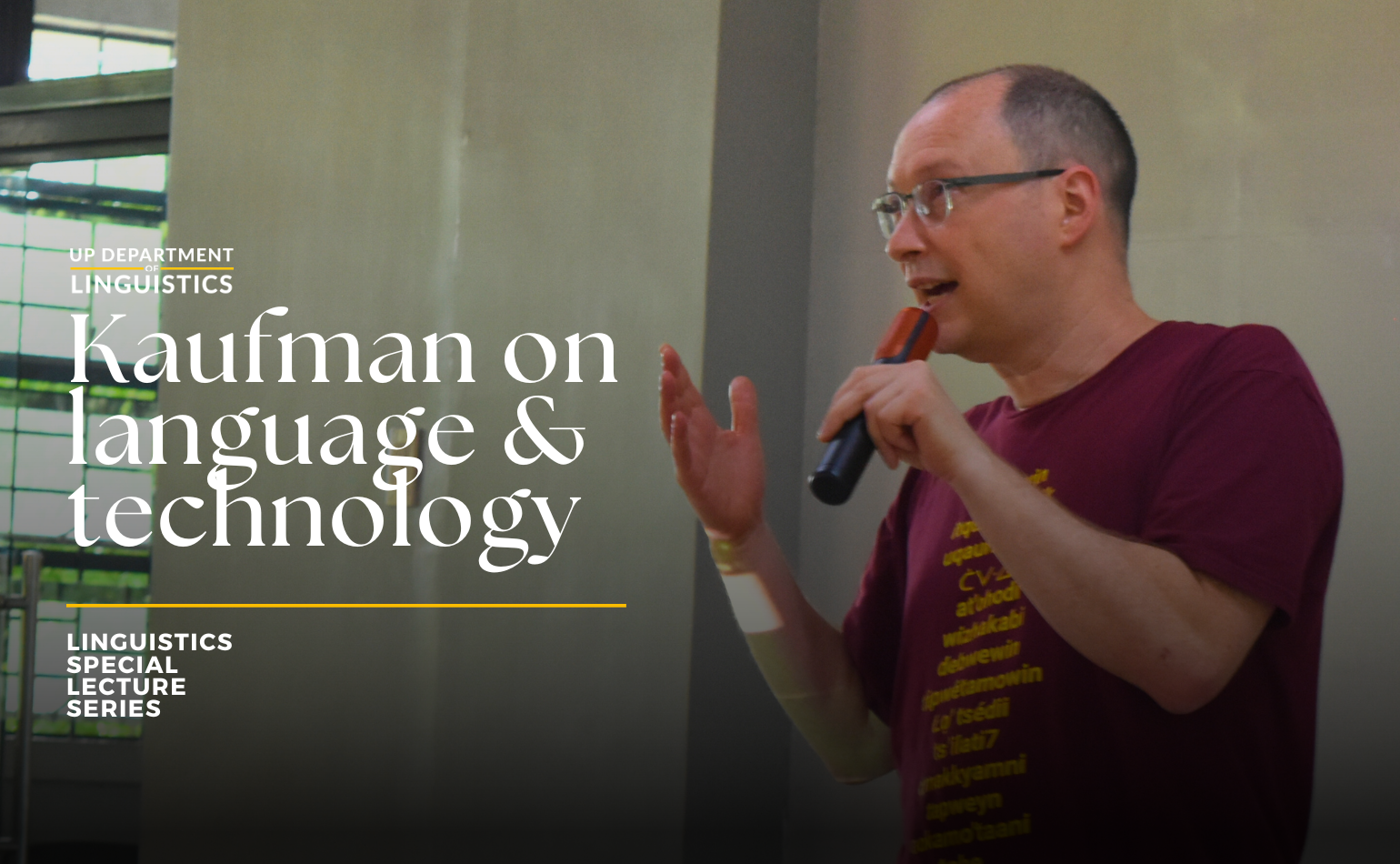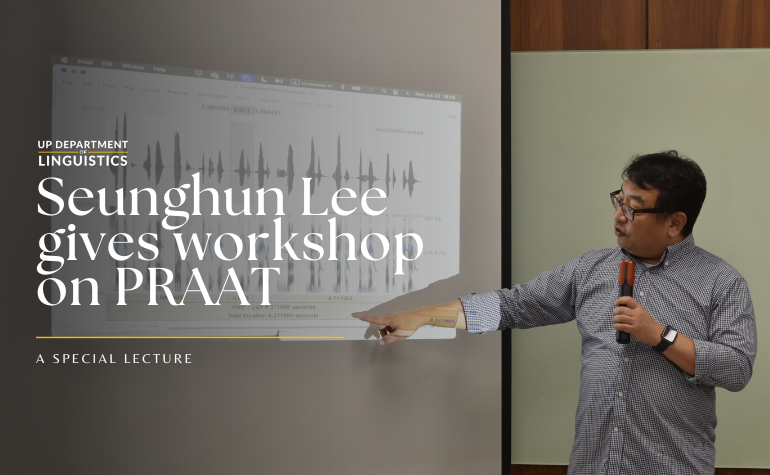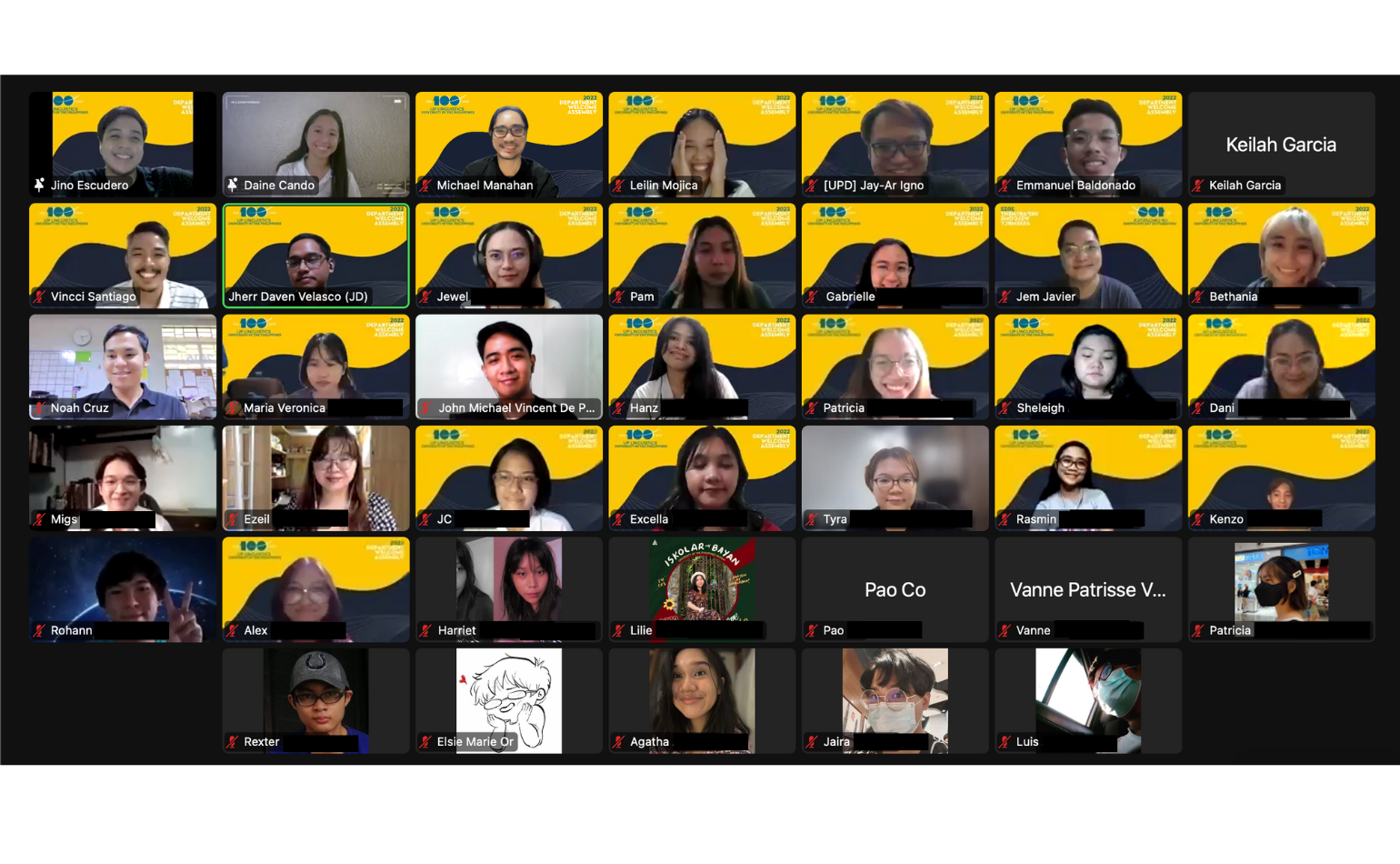
The Department of Linguistics recently held its annual welcome assemblies for the new and current undergraduate and graduate students for the Academic Year 2022-2023. The undergraduate welcome assembly was held on 10 October 2022 while the graduate welcome assembly was held on 13 October. Conducted online due to health protocols, both assemblies were attended by freshies, upperclass students, and faculty members.
Linguistics Undergraduate Welcome Assembly
To welcome newly admitted BA Linguistics students into the Department, Chair Maria Kristina Gallego formally opened the event with a message. In it, she emphasized the privilege of being accepted into the University and the program and hoped that this reminder motivates the freshmen to maintain their academic performance while enjoying student life. She also announced the centennial celebration of the Department and encouraged the students to watch out for and to participate in the events prepared by the Department throughout the year.
The opening remarks were followed by a short presentation by Asst. Prof. Jay-Ar Igno as Coordinator of the CSSP Office of Student Affairs (CSSP-OSA). Igno briefly explained the different office functions and facilities that are accessible to all students should they find the need for them. He assured that, aside from the students’ program advisers and the Department’s faculty and staff, the OSA is a place that students can turn to for their inquiries and concerns. With discussions about the possible full onsite setup for next semester in mind, Igno proudly announced news of a more PWD-friendly Palma Hall following the installation of a functional elevator inside the building.
Representatives from UP Samahang Linggwistika (UP SaLin) and the SparkLINGG core group then introduced their organizations to freshmen, shiftees, and transferees. BA Ling major and SparkLINGG member Emmanuel Baldonado explained how the core group serves as the “volunteer arm” of the Department. Led by the elected Linguistics Department Representative of the CSSP Student Council, SparkLINGG is involved in tasks such as disseminating important information to fellow Ling students and holding student assemblies to gather and resolve student grievances with the faculty.
As the “home org” of the Department of Linguistics, UP SaLin’s president Leilin Mojica highlighted the organization’s principles and projects– all of which aim to ensure an inclusive community and support system for Linguistics students, as well as to provide them with opportunities to participate in promoting and advocating for the field of linguistics in and out of the university.
In between the speakers’ segments, tips and advice collated from Ling upperclassmen prior to the program were shared with the audience. In doing so, the organizers hoped to ease some worries that the freshmen might have as they journey through their first semester in UP.
In a second presentation entitled “Career Prospects of a Linguistics Graduate,” Asst. Prof. Igno listed several work prospects for “life after Ling” where students may be able to apply both the hard and soft skills that they develop while studying under the program. He also affirmed the importance of language skills in any field of work. Since these skills are honed further by studying linguistics academically, Igno assures that Linguistics students will never run out of career opportunities after graduation.
The DWA for undergrad students concluded after a short Q&A segment and a photo-taking session. This year’s assembly was organized by senior BA Ling majors, Daine Cando and Antonio Jino Escudero, who also served as hosts of the program, Keilah Garcia, Pamela Lim, and Jherr Daven Velasco. This organizing committee was led by their program adviser, Inst. Michael Manahan.
Linguistics Graduate Students Assembly
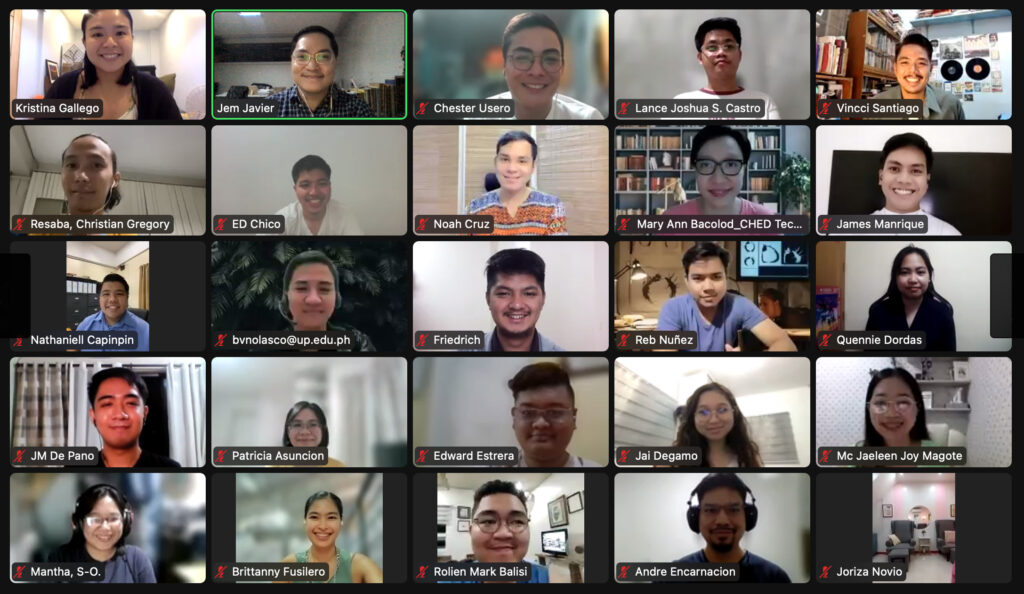
In the first segment of the program, MA Program Adviser Asst. Prof. Jem R. Javier gave an orientation about the graduate programs offered by the Department. He mentioned the academic requirements for each of the two programs, MA Linguistics and PhD Linguistics, that students need to accomplish in order to graduate from their respective programs. Asst. Prof. Javier also reminded the students about the program rules such as on applying for residence and leave of absence. Finally, he gave students an overview of the post-coursework requirements of the programs, which include passing a language proficiency examination, undergoing the thesis/dissertation proposal defense, and writing and orally defending their thesis/dissertation. He also reminded the PhD students about the comprehensive examinations that need to be passed prior to the dissertation proposal stage.
During the orientation, the graduate students were also informed about the areas under which the Department currently conducts its research activities: (1) Philippine Structural and Historical Linguistics; (2) Philippine Linguistics Geography; (3) Entanglements of Philippine Linguistics with Other Disciplines; (4) Comparative Studies of Filipino and Other Asian Languages; and (5) Asian Language Teaching Methods. Asst. Prof. Javier enumerated the disciplines under each area, which students might consider working on when they start writing their proposals for thesis or dissertation. MA Linguistics students were encouraged to do their respective theses under any of the first four areas mentioned, while PhD Linguistics students were reminded that as the specialization of the Department’s PhD program is on Philippine linguistics, their dissertation topic must fall under either of the first two areas mentioned.
After the (re-)orientation to the programs, students were informed about the newly implemented ethics clearance requirement for those who will start writing their thesis/dissertation proposals. Asst. Prof. Javier invited the graduate program majors to visit the CSSP-ERB website and navigate the pages therein in order to familiarize themselves with the requirements and procedures in securing an ethics clearance before conducting research. He also assured the students that a separate orientation program will be made, courtesy of the Linguistics Disciplinal Panel, at a later date.
Following the orientation to the program and requirements, an open forum was held after which Chair Gallego, delivered a short message welcoming the new and current students of the graduate programs. She thanked the participants who attended and the organizers who made the event happen. She emphasized the need for teachers and graduate students of the Department to meet occasionally as they share a common appreciation of and goal in promoting Philippine languages. Chair Gallego also affirmed that the Department is one of the institutions where students can attain knowledge and skills in studying language in general and Philippine languages in particular. She noted the effective support system that the Department offers its students, especially on research and publication, citing “The Archive” and “UP Working Papers in Linguistics,” as well as conferences, colloquia, and other academic activities, where students may disseminate the results of their research. She wrapped up the DWA for grad students by inviting all of the participants of the assembly to participate in the various activities that the Department has been organizing in celebration of the Department’s centennial anniversary.
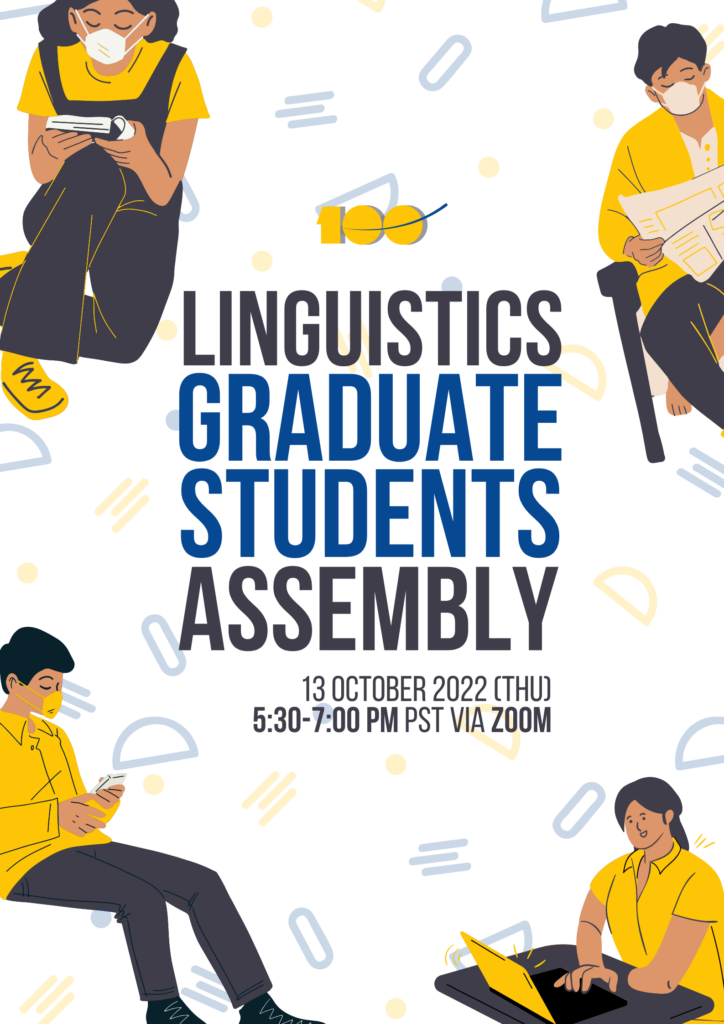
Published by Keilah Garcia and the UP Department of Linguistics


